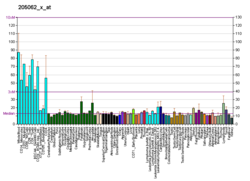ARID4A
AT rich interactive domain 4A (RBP1-like), also known as ARID4A, is a protein which in humans is encoded by the ARID4A gene.[5][6][7]
Function
[edit]The protein encoded by this gene is a ubiquitously expressed nuclear protein. It binds directly, with several other proteins, to retinoblastoma protein (pRB) which regulates cell proliferation. pRB represses transcription by recruiting the encoded protein. This protein, in turn, serves as a bridging molecule to recruit HDACs and, in addition, provides a second HDAC-independent repression function. The encoded protein possesses transcriptional repression activity. Multiple alternatively spliced transcripts have been observed for this gene, although not all transcript variants have been fully described.[5]
Interactions
[edit]ARID4A has been shown to interact with Retinoblastoma protein.[8]
References
[edit]- ^ a b c GRCh38: Ensembl release 89: ENSG00000032219 – Ensembl, May 2017
- ^ a b c GRCm38: Ensembl release 89: ENSMUSG00000048118 – Ensembl, May 2017
- ^ "Human PubMed Reference:". National Center for Biotechnology Information, U.S. National Library of Medicine.
- ^ "Mouse PubMed Reference:". National Center for Biotechnology Information, U.S. National Library of Medicine.
- ^ a b "Entrez Gene: ARID4A AT rich interactive domain 4A (RBP1-like)".
- ^ Defeo-Jones D, Huang PS, Jones RE, Haskell KM, Vuocolo GA, Hanobik MG, Huber HE, Oliff A (Jul 1991). "Cloning of cDNAs for cellular proteins that bind to the retinoblastoma gene product". Nature. 352 (6332): 251–4. Bibcode:1991Natur.352..251D. doi:10.1038/352251a0. PMID 1857421. S2CID 4357523.
- ^ Otterson GA, Kratzke RA, Lin AY, Johnston PG, Kaye FJ (Apr 1993). "Alternative splicing of the RBP1 gene clusters in an internal exon that encodes potential phosphorylation sites". Oncogene. 8 (4): 949–57. PMID 8455946.
- ^ Lai A, Lee JM, Yang WM, DeCaprio JA, Kaelin WG, Seto E, Branton PE (Oct 1999). "RBP1 recruits both histone deacetylase-dependent and -independent repression activities to retinoblastoma family proteins". Molecular and Cellular Biology. 19 (10): 6632–41. doi:10.1128/mcb.19.10.6632. PMC 84642. PMID 10490602.
Further reading
[edit]- Defeo-Jones D, Huang PS, Jones RE, Haskell KM, Vuocolo GA, Hanobik MG, Huber HE, Oliff A (Jul 1991). "Cloning of cDNAs for cellular proteins that bind to the retinoblastoma gene product". Nature. 352 (6332): 251–4. Bibcode:1991Natur.352..251D. doi:10.1038/352251a0. PMID 1857421. S2CID 4357523.
- Fattaey AR, Helin K, Dembski MS, Dyson N, Harlow E, Vuocolo GA, Hanobik MG, Haskell KM, Oliff A, Defeo-Jones D (Nov 1993). "Characterization of the retinoblastoma binding proteins RBP1 and RBP2". Oncogene. 8 (11): 3149–56. PMID 8414517.
- Otterson GA, Kratzke RA, Lin AY, Johnston PG, Kaye FJ (Apr 1993). "Alternative splicing of the RBP1 gene clusters in an internal exon that encodes potential phosphorylation sites". Oncogene. 8 (4): 949–57. PMID 8455946.
- Margottin F, Bour SP, Durand H, Selig L, Benichou S, Richard V, Thomas D, Strebel K, Benarous R (Mar 1998). "A novel human WD protein, h-beta TrCp, that interacts with HIV-1 Vpu connects CD4 to the ER degradation pathway through an F-box motif". Molecular Cell. 1 (4): 565–74. doi:10.1016/S1097-2765(00)80056-8. PMID 9660940.
- Lai A, Marcellus RC, Corbeil HB, Branton PE (Mar 1999). "RBP1 induces growth arrest by repression of E2F-dependent transcription". Oncogene. 18 (12): 2091–100. doi:10.1038/sj.onc.1202520. PMID 10321733.
- Cao J, Gao T, Giuliano AE, Irie RF (Feb 1999). "Recognition of an epitope of a breast cancer antigen by human antibody". Breast Cancer Research and Treatment. 53 (3): 279–90. doi:10.1023/A:1006115922401. PMID 10369074. S2CID 34896754.
- Lai A, Lee JM, Yang WM, DeCaprio JA, Kaelin WG, Seto E, Branton PE (Oct 1999). "RBP1 recruits both histone deacetylase-dependent and -independent repression activities to retinoblastoma family proteins". Molecular and Cellular Biology. 19 (10): 6632–41. doi:10.1128/mcb.19.10.6632. PMC 84642. PMID 10490602.
- Lai A, Kennedy BK, Barbie DA, Bertos NR, Yang XJ, Theberge MC, Tsai SC, Seto E, Zhang Y, Kuzmichev A, Lane WS, Reinberg D, Harlow E, Branton PE (Apr 2001). "RBP1 recruits the mSIN3-histone deacetylase complex to the pocket of retinoblastoma tumor suppressor family proteins found in limited discrete regions of the nucleus at growth arrest". Molecular and Cellular Biology. 21 (8): 2918–32. doi:10.1128/MCB.21.8.2918-2932.2001. PMC 86920. PMID 11283269.
- Fleischer TC, Yun UJ, Ayer DE (May 2003). "Identification and characterization of three new components of the mSin3A corepressor complex". Molecular and Cellular Biology. 23 (10): 3456–67. doi:10.1128/MCB.23.10.3456-3467.2003. PMC 164750. PMID 12724404.
- Meehan WJ, Samant RS, Hopper JE, Carrozza MJ, Shevde LA, Workman JL, Eckert KA, Verderame MF, Welch DR (Jan 2004). "Breast cancer metastasis suppressor 1 (BRMS1) forms complexes with retinoblastoma-binding protein 1 (RBP1) and the mSin3 histone deacetylase complex and represses transcription". The Journal of Biological Chemistry. 279 (2): 1562–9. doi:10.1074/jbc.M307969200. PMID 14581478.
- Beausoleil SA, Jedrychowski M, Schwartz D, Elias JE, Villén J, Li J, Cohn MA, Cantley LC, Gygi SP (Aug 2004). "Large-scale characterization of HeLa cell nuclear phosphoproteins". Proceedings of the National Academy of Sciences of the United States of America. 101 (33): 12130–5. Bibcode:2004PNAS..10112130B. doi:10.1073/pnas.0404720101. PMC 514446. PMID 15302935.
- Kimura K, Wakamatsu A, Suzuki Y, Ota T, Nishikawa T, Yamashita R, Yamamoto J, Sekine M, Tsuritani K, Wakaguri H, Ishii S, Sugiyama T, Saito K, Isono Y, Irie R, Kushida N, Yoneyama T, Otsuka R, Kanda K, Yokoi T, Kondo H, Wagatsuma M, Murakawa K, Ishida S, Ishibashi T, Takahashi-Fujii A, Tanase T, Nagai K, Kikuchi H, Nakai K, Isogai T, Sugano S (Jan 2006). "Diversification of transcriptional modulation: large-scale identification and characterization of putative alternative promoters of human genes". Genome Research. 16 (1): 55–65. doi:10.1101/gr.4039406. PMC 1356129. PMID 16344560.
- Monroe DG, Secreto FJ, Hawse JR, Subramaniam M, Khosla S, Spelsberg TC (Sep 2006). "Estrogen receptor isoform-specific regulation of the retinoblastoma-binding protein 1 (RBBP1) gene: roles of AF1 and enhancer elements". The Journal of Biological Chemistry. 281 (39): 28596–604. doi:10.1074/jbc.M605226200. PMID 16873370.
External links
[edit]- ARID4A+protein,+human at the U.S. National Library of Medicine Medical Subject Headings (MeSH)
- Human ARID4A genome location and ARID4A gene details page in the UCSC Genome Browser.
- Human RBP1 genome location and RBP1 gene details page in the UCSC Genome Browser.
This article incorporates text from the United States National Library of Medicine, which is in the public domain.





